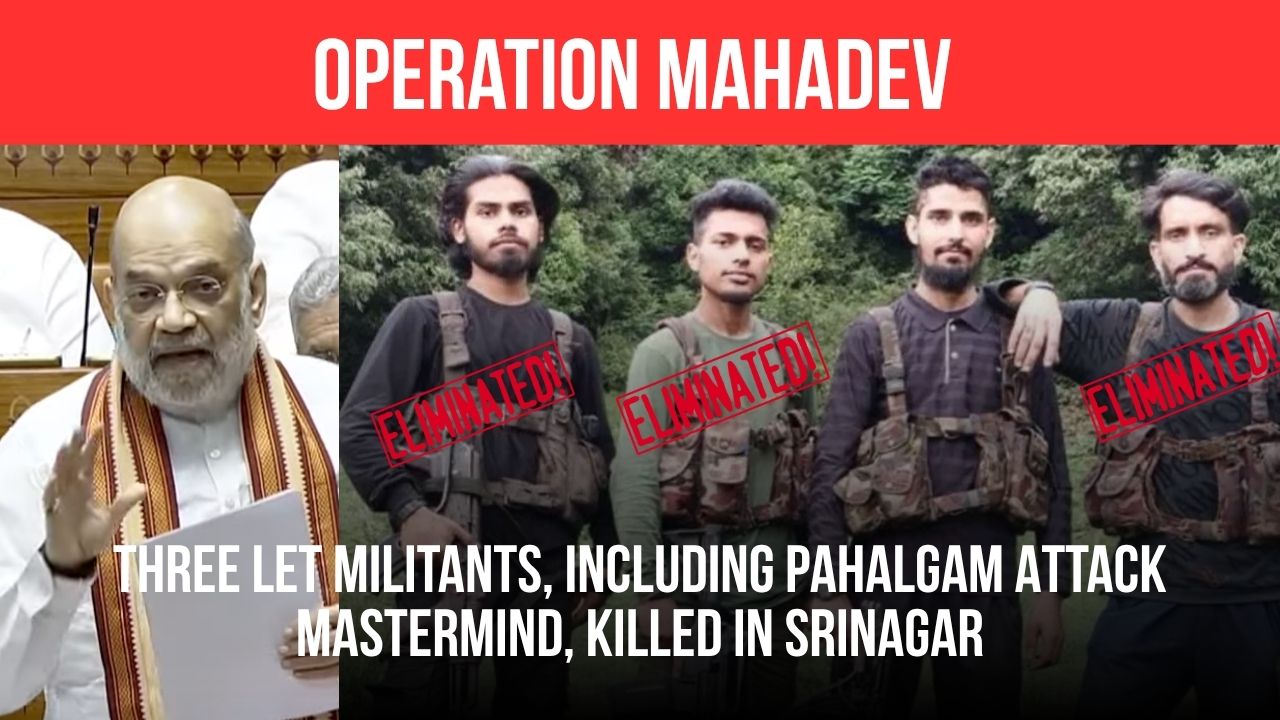Operation Mahadev: Mastermind and Two LeT Militants Behind Pahalgam Massacre Killed in Srinagar Encounter
Editor: Chandan M
Published on: July 29, 2025, 4:14 p.m.

Srinagar | In a major breakthrough in India’s fight against cross-border terrorism, three Lashkar-e-Taiba (LeT) terrorists responsible for the brutal April 22 Pahalgam attack were killed in a high-intensity encounter under Operation Mahadev, conducted in the Harwan-Dachigam forest area on the outskirts of Srinagar between July 28 and 29. Union Home Minister Amit Shah, addressing the Lok Sabha on July 29, confirmed that the militants killed were Suleiman Shah, alias Hashim Musa (the mastermind and chief planner of the attack), Asif Fauji, code-named Moosa, and Ali Bhai, also known as Talha—all Pakistani nationals affiliated with Lashkar-e-Taiba. The Pahalgam Attack: April 22, 2025 On April 22, gunmen ambushed a tourist bus in Pahalgam, Jammu and Kashmir, killing 26 civilians, including 25 tourists, and injuring several others. The coordinated assault lasted approximately seven minutes. The National Investigation Agency (NIA) and central security agencies launched a nationwide investigation and identified five attackers: the three aforementioned Pakistani nationals and two local operatives—Adil Hussain Thoker from Anantnag and Ahsan from Pulwama, both of whom are currently under investigation and reportedly received training in Pakistan. According to survivor testimonies and intelligence assessments, the attackers selectively targeted non-Muslim tourists. Passengers were reportedly asked to reveal their names and to recite the Islamic Kalima. Those who failed were executed at point-blank range. Initial responsibility was claimed by The Resistance Front (TRF), a known LeT proxy, but later retracted, leaving Indian authorities to conclude through evidence and analysis that LeT militants had orchestrated the massacre. Tracking the Militants: From April to July Home Minister Shah detailed how security agencies had been tracking an encrypted satellite communication device used by the attackers since April. On July 26, this device emitted a rare signal in the Dachigam forest area, leading security forces to zero in on the terrorists' location. Coordinated action by the Indian Army’s 4 Para (Special Forces), CRPF, and Jammu & Kashmir Police followed, culminating in the launch of Operation Mahadev. By 5:30 AM on July 28, security forces had sealed the perimeter to prevent the terrorists’ escape, particularly across the Line of Control. The Encounter and Identification The operation led to a fierce gunfight in which all three militants were killed. The bodies were transported to Srinagar, where previously detained overground workers (suspected of providing food and shelter to the attackers) positively identified the deceased as those involved in the Pahalgam massacre. Forensic examination of the recovered weapons further confirmed their identities. Among the items seized were: Pakistan-made voter ID cards Chocolates and provisions bearing Pakistani markings Two AK-47 variants One American-made M4 carbine The weapons were flown to a Chandigarh forensic lab, where ballistic tests matched the rifles and cartridges to those used in the Pahalgam attack. Aftermath and Official Response Home Minister Shah, while detailing the events in Parliament, stated: “The same hands that spilled innocent blood in Pahalgam have now been buried by the will of the nation.” He emphasized that the successful operation was a result of multi-agency coordination, technical intelligence, field surveillance, and forensic diligence. He also affirmed the government’s continued commitment to uprooting terrorism, particularly when linked to Pakistan-based groups like Lashkar-e-Taiba. The two local suspects, Adil Hussain Thoker and Ahsan, remain under scrutiny as security agencies analyze their support roles, logistical contributions, and potential links to handlers across the border. Conclusion The elimination of the three Pakistani militants behind the Pahalgam massacre has been described as a significant counterterrorism achievement. Indian security forces and intelligence agencies have highlighted the operation as an example of precision and perseverance. Families of the victims have expressed a sense of justice and closure. With cross-border terrorism continuing to pose a grave threat, Operation Mahadev stands as a stark message that perpetrators of such acts will be relentlessly pursued and brought to justice on Indian soil.